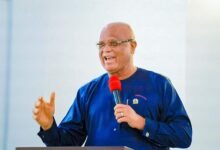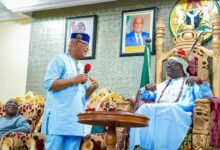
Tribute AMANAM NDEM: UNWELCOME NEWS AND THE PANGS OF A DIFFICULT GOODBYE
By Akpandem James
“Like the famed medicine man (abia ibok) of old, Amanam’s fame rose from his Ikot Akpan Abia community into all the surrounding communities in Ubium clan; and subsequently to the entire Akwa Ibom State and beyond. He no longer needed introduction. His name was synonymous with research-based balladry. His specialty was putting history in perspective – whether life, topical, thematic or artefact specific.”
The Ubium people of Akwa Ibom State have a proud ancestry. It is backed by solid history. Some prominent sons of the clan and eminent scholars have written copiously about the great heritage of the people. I’ve read quite a lot about them, my people; but on Saturday December 17, 2022 I heard the most thematic history of Ubium delivered in less than 20 minutes. It was not an academic presentation, it was an encyclopaedic ballad. It was rendered by a home-bred balladeer, Obong Amanam Ndem.
Like the famed medicine man (abia ibok) of old, Amanam’s fame rose from folkloric story telling in his native Ikot Akpan Abia community into all the surrounding communities in Ubium clan; and subsequently to historical revelations and good governance advocacies in the entire Akwa Ibom State and beyond. He became a common feature at official state functions, public events of serious dimensions and big ceremonial gatherings. He no longer needed introduction.
His name was synonymous with research-based balladry. His specialty was putting history in perspective – whether life, topical, thematic or artefact specific.
When I glanced through the programme of events of the “Ubium Home-coming 2022”, which took place that day at Ikot Okpudo, I noticed his name. He was to make a rendition.
I was not in the least surprised, for he was like the Alligator pepper, never absent in a concoction. He used to do it for others, why wouldn’t he for his own clan! I was expectant. I was not disappointed. Under 20 minutes, in a breezy manner, he told the entire history of Ubium clan – the origin, the people, the heritage, the deities, the exploits of its sons and daughters, name it! When he was done, I turned and looked at the Deputy Vice Chancellor of University of Abuja, a professor of history, Phillip Afaha, who sat next to me. He nodded knowingly. He got the non-verbal message, and concurred.
The man, Amanam, delivered!
Amanam used to walk with a slight gait; a sign of confidence. He used to carry a smile that looked plastered on his face. He was a happy go lucky personality. That day, I looked intensely at him. Those features were not really there. He tried the gait as he descended the podium. It didn’t quite fit; but he still managed the smile. He looked worn, even after the superlative performance. He was not his sprightly self. I couldn’t help but point out my observation to Prof, Afaha who agreed that all did not seem well with his health. Amanam looked more like someone who was either going through intense stress or recuperating from one.
In his careful, not really measured steps, he still went round to greet dignitaries on the front row while acknowledging compliments from the audience. My suspicion became more pronounced when he got to the Clan Head, His Royal Highness Etebom Ukpong Noah Udoewa, who sat a few spaces away from us, in the front row.
He was about to step down from the raised platform which we sat when he noticed Prof. Afaha and me. He walked straight up, shook hands, exchanged banters, and hailed us as “Abuja people”. He then walked away and disappeared into the crowd. We looked at each other again. It was obvious something was not right. That was not the Amanam that we used to know. But then he was Amanam still, because he exuded that confidence of a talented balladeer. As I watched him go, I said a silent prayer for his quick return to excellent health.
When eventually I heard that he had joined his ancestors on March 31, this year, I was crestfallen. Good grief, so he couldn’t make it! What a shame to lose such a talent in his prime.
Amanam was a tonic at events. His voice was unmistakeable, his lines were unique; but most importantly the lessons from his rendition were quite illuminating, quite educative and quite relaxing. They were usually tutorials in story form, told in a breezy manner – easily digestible and often exciting and comforting. He used his talent to bring happiness, create awareness and canvass support for a better society.
A lot has been said about Amanam since his painful demise but a poem, “Where Goodbye(s) means what the hands cannot do anymore” by Moses Anderson, a Nigerian poet, captures the mood of his departure. The poem has “After Amanam Ndem” as an indicator of a tribute; and is prefaced by a quote by Olumide Manuel:
“You have heard that the cemetery has more talents, but this I tell
you, harbour no fear. In this life, we will fall, fail, and die.
And it doesn’t diminish the beauty of being here in the flesh.”
Anderson’s poem ordinarily sounds like a eulogy from a broken soul; but then it reads more like a dirge. It throws up a confused symphony, a similitude of a tragic orchestral interlude which death itself represents. You could feel the sting of the grim reaper and the pain of the bereaved. The first and last stanzas of the poem epitomise the prologue and epilogue of the travails of a deprived soul – the audacity of unwelcome news and the pangs of a difficult goodbye.
The first and last stanza read:
“At midnight, I stepped into the armpit of the rain
to embalm your kindred body on the entrance
of my lip. To be sure the news was a dream,
I lapel half of you in my mouth. By this, I measure
the amount of loss sitting on my tongue
like grains of April dust. A bus driver says,
kai, life na housefly. & I phone-tap an
emoji that embodies the number of times
a river lingers in my eyes, & the number
of times I watch your name spring into
a church hall like heavy smokes.
“… It’s midnight again & one of the boys bones
out your miniature — I jumped inside a coffin
& placed two Bible verses on the centre of your chest.
I want to say; this is for the goodbyes you left unsaid.
But the stranger says — son, there’s time for everything.”
The sad reality is that Obong Amanam Ndem is gone, physically. His family plans to commit his remains to earth on Saturday, July 22, 2023 in his hometown, Ikot Akpan Abia Ubium. An obvious fact is that official and public events in Akwa Ibom State will never be the same again with his eternal departure. Consolation, however, is that he has etched his name in public consciousness and would always be remembered whenever a balladeer is on stage.
Sometime ago he had broached the compilation of his renditions. I hope he did. That might remain as a memorial, a memento, that once upon a time a great balladeer walked the plains of our existence. Like the local choristers in a funeral procession would chorus ‘Obong Amanam Ndem has finished his mortal race triumpahntly, let the inhabitants of the earth take heed’ (Obong Amanam ameyong k’idara o! Yak mme ndidung obot ekere idem).
James, a communication strategist, is the Vice President of Ubium Development Association (UDA)










